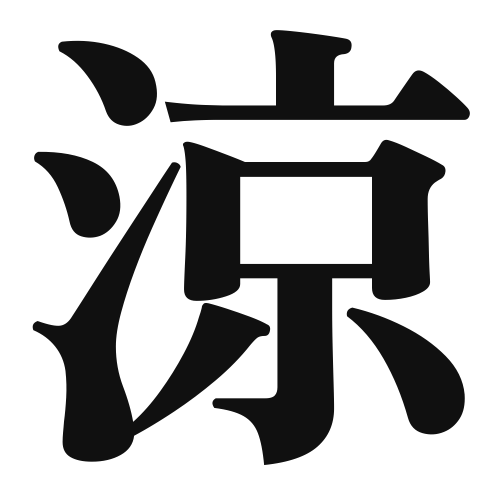1. Overview of Meaning
The kanji “涼” (ryou) means “cool” or “refreshing.” It is often used to describe a pleasant coolness, especially in relation to weather or temperature.
2. Formation and Radical
Formation of the Kanji: The kanji “涼” is a phonetic-ideographic character (形声文字). It combines the water radical (氵) on the left, which relates to liquid or water, and the phonetic component “良” (ryou) on the right, which contributes to its pronunciation.
Radical: The radical of “涼” is 氵, which is a variant of the radical 水 (water), indicating that the meaning is related to water or coolness.
3. Examples of Usage
Common Words and Phrases:
- 涼しい (すずしい, suzushii) – cool, refreshing
- 涼風 (りょうふう, ryoufuu) – cool breeze
Example Sentences in Daily Conversation:
- 今日は涼しいですね。 (きょうはすずしいですね。) – It’s cool today, isn’t it?
- 涼風が気持ちいいです。 (りょうふうがきもちいいです。) – The cool breeze feels nice.
4. Synonyms and Antonyms
Similar Kanji:
- 冷 (れい, rei) – cold; while both “涼” and “冷” relate to coolness, “冷” often implies a lower temperature or chilliness.
- 爽 (そう, sou) – refreshing; this kanji emphasizes a sense of freshness and clarity, often used in a more positive context.
Antonyms:
- 熱 (ねつ, netsu) – heat; this kanji represents high temperature or warmth, contrasting with the coolness of “涼.”
- 暑 (あつ, atsui) – hot; it describes hot weather, which is the opposite of the refreshing quality of “涼.”
5. Cultural and Historical Background
Relation to Japanese Culture: The concept of “涼” is significant in Japanese culture, especially during the hot summer months. It is often associated with summer festivals and traditional practices that seek to find relief from the heat.
Proverbs and Idioms:
- 涼しさを求める (すずしさをもとめる) – to seek coolness; this phrase reflects the cultural importance of finding ways to stay cool during hot weather.
- 涼風の中で (りょうふうのなかで) – in the cool breeze; often used in poetry and literature to evoke a sense of peace and tranquility.
